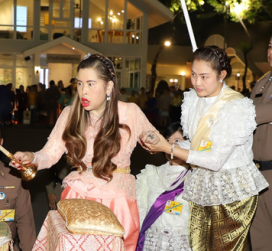The Bangkok Post reports that Prime Minister Gen Prayuth Chan-ocha has provided “further assurances that all Thais will receive Covid-19 jabs and warned the media not to sow confusion over the state vaccination programme.” He did this as the government cancelled its booking app.
He continued to say that “the rollout of the AstraZeneca vaccine planned for next month … will proceed as planned.”
Meanwhile, the private sector is taking a increasing role in the vaccine campaign, especially in Bangkok, with department stores, malls, the Board of Trade of Thailand and private hospitals seemingly taking the lead.
And, it seems the  Chulabhorn Royal Academy’s ham-fisted foray into vaccines, cutting through constitution and law, is morphing. It is as if no person responsible for the administration of the “Academy” had thought much about the sudden royal intervention.
Chulabhorn Royal Academy’s ham-fisted foray into vaccines, cutting through constitution and law, is morphing. It is as if no person responsible for the administration of the “Academy” had thought much about the sudden royal intervention.
The Bangkok Post reports that Dr Nithi Mahanonda, the Academy’s secretary-general announced that “[o]ne million doses of Covid-19 vaccine from Chinese state-owned Sinopharm will arrive in June and be offered as a paid alternative for particular groups who don’t want to wait…”. He specifically targeted the “private sector or any agencies which are at risk and want to speed up the process…”.
Dr Nithi added “that as the vaccine will be procured with the academy’s budget, it could not be offered free of charge.” He said the price would “not exceed 1,000 baht per shot…”.
This was something of a shock, for as the Bangkok Post states, “most people assumed that the imports would be offered free of charge as an adjunct to the state vaccination programme.”
The price is not out of line with prices cited in other places where the sale price per dose of the two-dose regime for the Sinopharm’s vaccine is reported to be between $19-$36. As usual, the Chinese government does discounts and “friendship prices” for some places. AstraZeneca is less than half of the lowest price in this range.
(For those interested in efficacy, this non-medical article might be of some interest.)
Nithi then further sank the public’s understandings and maybe even hopes when he stated: “I do not think that members of the public can come to receive it…”.
This led to predictable criticism, with Nithi clarifying: “I apologise if I might have talked too fast during the press conference, causing a misunderstanding that we’ll profit from the vaccine…. We won’t charge an extra baht…”.
We are left to wonder why? Why a royal intervention? Was it a propaganda opportunity? Was it a way to cover up for delays at Siam Bioscience? Did some royal do a deal in or with China? Did the Chinese government make an offer to a royal? Given the private sector’s increasing role, approved by the state, why was a royal intervention necessary if it is just acting like other vaccine procurers? More importantly, what of the constitutional and legal bending and cracking that it involves? Why?
Update 1: The shemozzle looks more bizarre by the day. Thai Enquirer reports that Interior Minister Gen Anupong Paochinda has ordered that “provincial governments must gain approval from the Centre for COVID-19 Situation Administration (CCSA) before they buy coronavirus vaccines…”. This order “came after Pathum Thani governor Chaiwat Chuenkosum said that his province is ordering 500,000 doses of Sinopharm vaccines from Chulabhorn Royal Academy (CRA).” This potential collaboration and sale has been confirmed by the “Academy.” So fully half of the vaccines it imports will be sold to one province. What on earth is going on? Any of our readers know?
Update 2: A comment by Gen Prayuth Chan-ocha makes the royal (imported) vaccine muddier still. He is reported to have stated:
On the national Covid-19 vaccine rollout, he said the government will proceed according to its plan.
“Every vaccine must be imported with the government-to-government method. We have a committee working on this,” he said.
So why was there an “Academy” intervention?
Update 3: The royal intervention has done little but has made the constitutional waters muddier than ever. Public Health Minister Anutin Charnvirakul has reiterated that Siam Bioscience is a problem:
As for the bulk of the AstraZeneca vaccine, which will be mainly used in the country during the second half of the year, Anutin said that the allocation is based on the doses deliverable under the contract with AstraZeneca, regardless of where they have been manufactured. Some are produced in Thailand and some will be imported to meet the contracted deliverables.
Meanwhile, Chulabhorn’s self-named “academy” is now just an also-ran among “universities,” and a bunch of private sector forays into the vaccine market.











